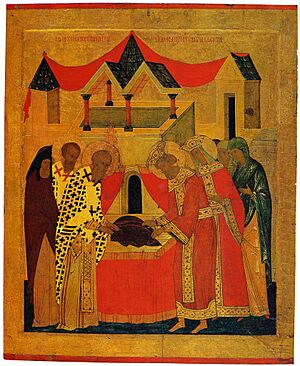Gennadius of Constantinople facts for kids
Quick facts for kids Gennadius of Constantinople |
|
|---|---|
| Ecumenical Patriarch of Constantinople | |
 |
|
| Enthroned | 458 |
| Reign ended | 471 |
| Personal details | |
| Born | Antioch, Syria Prima |
| Died | 25 August 471 Moro Nero, Roman Cyprus |
| Denomination | Chalcedonian Christianity |
Gennadius (Greek: Γεννάδιος; died August 25, 471) was a very important church leader. He was known as the Patriarch of Constantinople from 458 until his death. Gennadius was a smart writer who studied the Bible carefully. He is remembered in the Eastern Orthodox Church on November 17.
Contents
Life and Leadership
Gennadius first wrote publicly around 431 or 432. He wrote against Cyril of Alexandria, another church leader. Gennadius criticized Cyril's writings, saying, "How many times have I heard bad things from Cyril of Egypt?"
However, Gennadius likely became friends with Cyril in 433. If a letter from Cyril in 434 was to Gennadius, it shows they were friendly.
Becoming Patriarch
Gennadius was a presbyter (a type of priest) in Constantinople. In 458, he took over from Anatolius as the Bishop of Constantinople. From the very start, Gennadius showed great dedication to the Christian faith. He also worked hard to keep order and discipline in the church.
Dealing with Challenges
Gennadius's wisdom was soon put to the test. Timothy Aelurus was a Monophysite (someone with different beliefs about Jesus). Timothy had made himself the Patriarch of Alexandria. He was later removed from his position by the Roman emperor.
Timothy then tried to return to Constantinople to get his job back. On June 17, 460, Pope Leo I warned Gennadius about Timothy Aelurus. Pope Leo asked Gennadius to stop Timothy's journey. He also urged Gennadius to make sure an Orthodox Patriarch was chosen for Alexandria right away. As a result, Timothy Aelurus was sent away. Timothy Solofaciolus was chosen as the new bishop of Alexandria.
Around the same time, Gennadius showed his generosity. He appointed Marcian, a Novatianist who had joined the Orthodox church, to manage the church's property in Constantinople.
Stories of Gennadius's Faith
Two monks told a story about a reader named Carisius. Carisius worked at the church of Saint Pope Eleutherius in Constantinople. He was not living a good life. Gennadius first told him off, then had him punished. When these actions did not help, Gennadius prayed to Saint Eleutherius. He asked the saint to either fix Carisius or take him from the world. The next day, Carisius was found dead. This event scared the whole town.
Another story tells of a painter who drew Jesus looking like the Roman god Jupiter. The painter's hand became weak. But Gennadius's prayers healed him.
Working with Daniel the Stylite
Around this time, Daniel the Stylite began living on a tall column near Constantinople. He did this without permission from the Patriarch or the landowner. The landowner was very unhappy about this.
The Emperor Leo protected Daniel. Later, he sent Gennadius to make Daniel a priest. Gennadius stood at the bottom of the column to do this. Daniel did not want to be ordained and would not let the bishop climb the ladder. At the end of the ceremony, Gennadius climbed up to give Holy Communion to Daniel. He also received it from Daniel.
According to one historian, Gennadius would not let anyone become a church leader unless they had memorized the entire Book of Psalms.
Fighting Against Simony
The Council of Chalcedon had already taken steps against simony. Simony is the buying and selling of church positions. Around 459, Gennadius held a large council with 81 bishops. Many of these bishops were from the East and even from Egypt. Some had lost their church positions because of Timothy Aelurus.
This council wrote a letter against simony. It added a strong warning, called an anathema, to the previous rules.
Gennadius passed away on August 25, 471. He is remembered as a skilled and successful leader. Historians have praised his work.
Writings and Teachings
John Moschus said that Gennadius was very gentle and pure. Gennadius of Marseilles described him as having a "refined tongue and sharp mind." He was also very knowledgeable about ancient writings. He wrote a commentary, which is like a detailed explanation, on the entire Book of Daniel.
A continuation of Jerome's Chronicle mentions that Gennadius also wrote commentaries on all the letters of Paul of Tarsus.
Gennadius wrote many other works, including commentaries on parts of the Old Testament. He also wrote many sermons. Only small pieces of his writings remain today. These fragments include parts of Genesis, Exodus, Psalms, Romans, 1 and 2 Corinthians, Galatians, and Hebrews. They show how biblical texts were explained in the 5th century.
Gennadius was a learned writer who followed the Antiochene school. This school focused on the literal meaning of the Bible. His work on the Book of Romans, which explains different Bible verses, is considered his most important surviving work.

